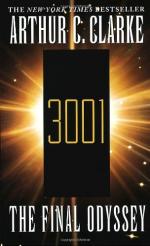|
This section contains 1,094 words (approx. 4 pages at 300 words per page) |

|
Arthur C. Clarke uses 3001: The Final Odyssey, the last novel of the "Odyssey"series, to sketch a Utopian humanity taking charge of its own destiny. Humans have come close to perfection in individual health, welfare, and opportunities for education and achievement. Humanity is collectively expanding Earth's usable habitat, is working to reshape the environs of Mars and Venus for eventual colonization, and is alert to any threats from outside forces.
In his characteristic sweeps of generalization, Clarke offers a grand view of human progress and survival. Recovered from a "hibernaculum" or space pod en route out of the solar system, Frank Poole, one of the casualties when the computer HAL took over the ship Discovery in 2001: A Space Odyssey (1982; see separate entry), is returned to Earth's Star City. As Poole's elite caretakers orient the resurrected astronaut to their advanced society and its history, Clarke delivers visions...
|
This section contains 1,094 words (approx. 4 pages at 300 words per page) |

|




